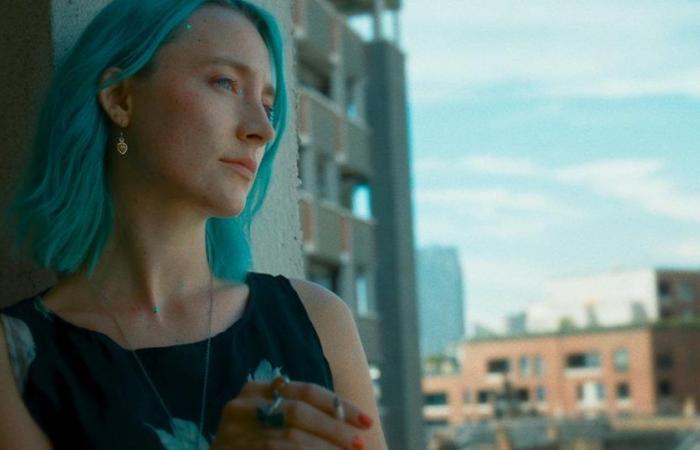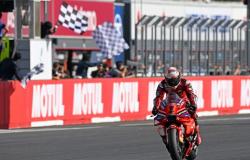INTERVIEW The actress plays the leading role of The Outrunthe story, inspired by true events, of a young woman trying to cure her alcoholism by taking refuge in the Orkney Islands, an archipelago in the far north of Scotland.
The story could evoke a new age fantasy, an extreme detox: Rona, in her twenties, is an alcoholic. To the point of losing his health, his dignity, his job and his partner. Destitute after rehab, she has no choice but to return to live with her mother in Orkney, where she grew up. An archipelago of tiny islands located in the far north of Scotland, a collection of windswept moors and rocks. It is there, in contact with nature, with the few inhabitants and in search of a rare bird, the king quail, which she is responsible for listing, which she will try to heal, as much mishandled by storms and the cold and solitude only through his memories and his own demons. The Outrun is a harsh film, the story of a constant battle against self-destruction.
The scenario is inspired by a true story: that of the British Amy Liptrot, who told it in The Gapa magnificent novel published in 2018, from which the film is adapted. Irish-American Saoirse Ronan (Come Back to Me, Lady Bird, The Four Daughters of Doctor March…), who also co-produced the film, brings to the role her aura of a delicate, fragile creature, with hair as blue as her eyes, shot through with frank determination. Encounter.
”
data-script=”https://static.lefigaro.fr/widget-video/short-ttl/video/index.js”
>
Madame Figaro.- What did you feel while reading The Gap the book from which the film is adapted?
Saoirse Ronan.- I felt immediately connected to it. Like many people, I was affected by alcoholism because I saw people suffering from it. The way Amy spoke about it allowed me to relate to it emotionally, without feeling anger or resentment: all of that tends to fade away when you put yourself in the shoes of someone going through this ordeal. I was attracted by the balance of his text, his poetry, and the fact that it was very “anchored”: there was no pretension, it was alive. And I liked the fact that we followed a young woman, which is rare when we’re talking about alcoholism. These are stories, characters that we don’t often see on screen.
Why do you think?
I think we’ve accepted now that men of a certain age have a drinking problem, and that’s normal, there are a lot more of them. But it’s important to show a young woman leading this fight because it reminds us that mental health, or addiction, does not discriminate. It can affect everyone, regardless of gender, race, age, social background.
Also readFemale depression: “We must be alerted as soon as symptoms appear”
Are women more difficult to judge when it comes to alcoholism?
Of course, because we always raise the bar with them, at all ages. Especially if they have children: they are supposed to be the pillar of the family, pure, immutable and strong. But when you learn that alcoholism is a mental disorder, a neurological pathology that affects many people, you understand that it is not a choice. This stems from the depression, stress, and anxiety that women experience as much, if not more, than men.
DR
Do you have anything in common with Rona?
The environment in which we were raised. She grew up in a wild, rural area in Scotland, and wasn’t like the other kids in the area: she was a bit on the margins, and treated as such. I had the same experience: I was born in New York to Dublin parents, I grew up in the Irish countryside but I started traveling and working around the age of 10, 11. This ostracized me even more, so I was able to understand this feeling of being “outside”, and wanting to fit in.
The Outrun tells the story of healing and redemption through isolation and contact with nature… How to avoid the pitfall of the detox fantasy?
The book, like the film, never makes a secret of the difficulty of the character’s fight, how painful it is, and the fact that she is constantly at risk of relapsing. Rona experiences anxiety every day. Going home is the hardest way to heal: you’re like under a microscope, surrounded by people who know you. Impossible to resort to anonymity, like a mask or a shield. But this forces us to take stock of what we need, to change, to identify the bad habits that we need to get rid of. Finally, Rona only finds her true strength, and her identity, by going to the island of Papay (one of the most remote islands, populated by barely a hundred inhabitants, Editor’s note), in a place that is connected to her home, but is not where she grew up. This is also where Amy isolated herself to write her book.
You shot some of the scenes in the film there: what is your fondest memory?
Getting closer to the film crew and the people who live in Orkney. We could not have made this film without them, their welcome, their spirit, their positivity, their charm. We filmed during the week, and on the weekend, with other girls, we went swimming naked in the sea, because it was the time of year when the weather was the most beautiful. We spent our time together, and we were all at roughly the same time in our lives, around our thirties: the age when we start to make big decisions, to want to settle down a little, to know who the we want to be. When we take stock of the values we defend, the people we want to keep in our lives, what we really care about. We had some great conversations, and for them to take place in this kind of environment was really inspiring.
DR
What would you recommend to those who want to visit Orkney?
Put on several layers of clothing. Take a raincoat. No umbrella, it’s too windy. Read local literature. Not just Amy’s books, but those of George Mackay Brown, a famous Orkney writer. This provides exposure to the folklore of the islands, which plays a big role there. And above all: surrender to a slower pace.
Do you find it easy yourself?
Yes, because I value it a lot. Besides, I haven’t been able to afford it for a long time, and it makes me a little anxious. One of the best things about starting work so young is that I know how to recharge my batteries. I’m not constantly on his phone, I’m not on social media. When my partner and I go to isolated areas of the world, we cut ourselves off completely, and we know how beneficial it is. I always try to make time for that.






